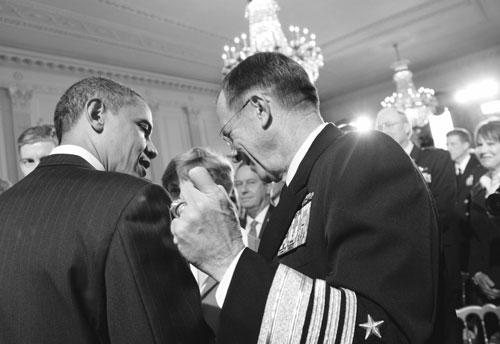
President Barack Obama speaks with Joint Chefs Chairman Adm. Mike Mullen, in the East Room of the White House in Washington, Jan. 24, 2011, after announcing new government-wide initiatives to support military families, including programs aimed at preventing suicide and eliminating homelessness. (J. Scott Applewhite/THE ASSOCIATED PRESS )
The new presidential initiative to support military families is officially underway.
President Obama, First Lady Michelle Obama and Dr. Jill Biden introduced the “Strengthening Our Military Families: Meeting America’s Commitment” plan last week in an East Wing meeting with the press.
The plan identifies four priorities: Enhancing psychological health, ensuring improved education for the children of military members, developing career opportunities for military spouses and increasing child care availability.
This government initiative is much needed according to students who have served in the military or grown up on a military base.
Grey Reed, a junior at Southern Methodist University, entered the Air Force in 2006. He feels that helping people in the military with their mental health and well-being should be at the top of the government’s new plan.
“When people get back [from deployment] they are diagnosed with Post-Traumatic Stress Disorder (PTSD), and a lot of military people blow it off,” Reed said. “Most military people are hard. They see stuff and they don’t know how to process things.”
Nicole Salazar, a University of Texas at Arlington student, grew up on a military base and is glad that some of the focus will be on the children.
“I think that he is right in focusing on helping the family. It can be pretty hard for some people to deal with having their mom or dad gone for long periods of time,” Salazar said. “Giving them as much help as possible should be a top priority for the military.”
Higher education for those on base is one aspect SMU junior Nick Brown wishes they would focus on.
Brown served in the Marine Corps from 2003-2007 and his wife, who lived on the military base, had to put her education on hold for two years.
“I think a lot of people don’t realize what kind of a sacrifice military families make,” Brown said. “I hope the new programs put more of a concentration on quality education on bases instead of just online classes.”
Brown also hopes that communication between families back home and their deployed family members can improve. While he was in Iraq on his second deployment he was injured and had no way to let his wife know that he was OK.
SMU junior Wesley Lavender also thinks that improved communication would help families of the deployed as a whole.
“The government should work to use technology, such as Skype, to connect children to their deployed parents to make it easier to deal with,” Lavender said. “Spouses need a lot of support too, so programs that bring spouses of deployed soldiers together would be greatly beneficial. These programs would naturally prevent depression and suicide among military families.”
The new initiative drew together nearly 50 commitments by various Federal agencies to set up a unified front in supporting the United States military.
Each cabinet secretary vowed to commit to these priorities, share expertise and continue to create better solutions through working together.
“You’ve been everything we could ask you to be. You have done your duty,” Obama said in his announcement. “And as a grateful nation, we must do ours. We have to make sure that America is serving you as well as you have served us.”














